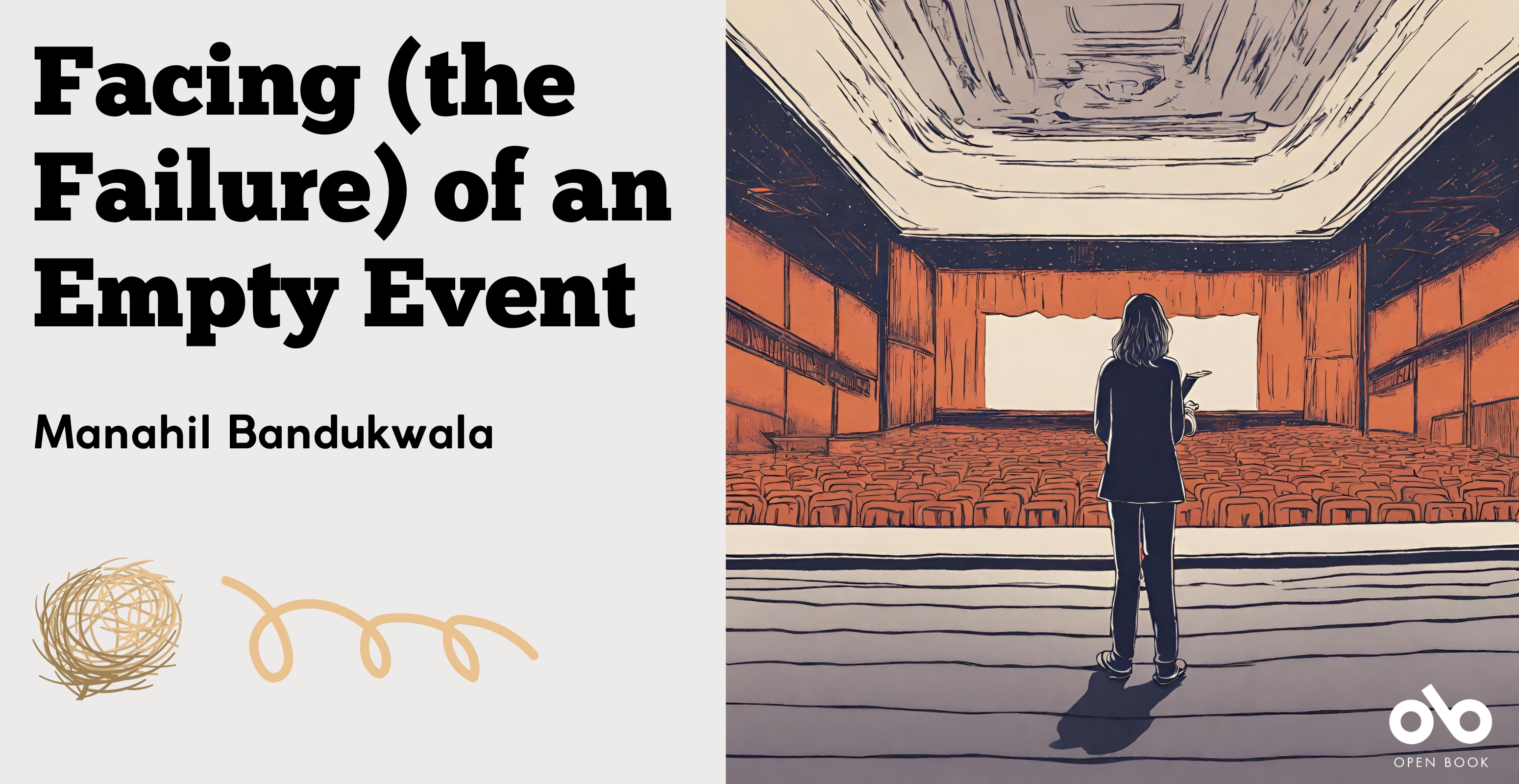Facing (the Failure of) an Empty Event
By Manahil Bandukwala
There’s a particular kind of feeling to describe preparing and planning for a literary event, only to show up and find the room empty, or nearly empty. You keep looking at the door hoping the passers-by will stop and come inside. It’s worse being a host and having a sense of responsibility for your readers, and the feeling that you’ve wasted their time when no one shows up. I briefly touched on this sentiment in a column for Open Book last summer on Being an Author during a book tour, but I wanted to spend a column on the topic of the “empty event.” This was an experience I thought was unique to me until I saw posts by prominent writers about experiencing the same.
Most writers (including myself) share successes. We’ll post our journal acceptances, book publication contracts, and reviews of our books. We’ll make gratitude posts about how full and wonderful a book launch left us.
Some writers are making a point of sharing the failures too. The number of journal rejections against the number of acceptances is a failure I see being shared more and more. There are, of course, posts from writers about how they read to empty bookstores and venues during their respective book tours, but those posts aren’t as extensive as sharing other forms of writing setbacks. I’m definitely not the best at sharing my own writing failures or the anxieties around them either.
An empty event brings a particular mix of disappointment and embarrassment, and that makes it particularly difficult to talk about. With a magazine or publication rejection, the news comes directly to my inbox. No one is there to witness the rejection. I’m disappointed, but I’m not embarrassed. I delete the email and go on with my day, the entire ordeal being over in five minutes. With an event, the other people present know. I have to grit my teeth and get on stage, reading to an empty room. I have to endure the awkward tension for at least the duration of the event, and during the ride home (which, living in a suburb of in the Greater Toronto Area, is pretty long). I might even have to bear people asking me how the event went afterwards as they sometimes apologize for missing the event, which doesn’t let me push the evening out of my mind.
In the days before my book launch for my first poetry collection, Monument, I sat with my friend and counted the number of people I knew for sure were attending to reassure myself that people would attend. There was a severe thunderstorm the morning of the event, and I sat by the window telling myself the rain was slowing down. When you spend so much time and energy planning the logistics of an event, there is a certain sinking feeling when few to no people show up. There were stops on the Monument tour where I could count the number of people who attended on my fingers, and that included partners or publishers of the readers. I would ask myself if the time and energy I had put towards that event had even been worth it.
Your CanLit News
Subscribe to Open Book’s newsletter to get local book events, literary content, writing tips, and more in your inbox
In this article, I’ve referred to the “failures” as “mine.” That is far from the truth. An empty event venue isn’t a reflection on your writing or you as a person. I can’t remember the names of the writers who have shared their less-than-positive literary event stories. I remember the sentiment of the posts, though. Reading those posts suddenly made me feel a whole lot better about reading my work to only the hosts and the other readers. These were writers who had won major awards, whose books were prominently displayed on bookstore shelves and bestseller lists. If they were reading to empty rooms from time to time, then maybe there wasn’t anything I was doing wrong.
Ultimately, I try to tell myself to let the failure roll off. There’s a whole list of reasons why some events pull bigger crowds than others. Bad weather, the time and energy someone has, other events happening at the same time, and so much more. I’ve been on the other side of this too, where I’ve wanted to make my way to someone’s book launch or reading, but when the time rolls around I’m not able to make it. In the moment though, being at an empty event, those various reasons can do little to stop the embarrassment and disappointment.
I wish I could close this post with a note of advice for writers on tips and tricks to avoiding empty events. There are, of course, steps that hosts and writers can take to increase the likelihood of people attending an event, but it’s unlikely that a writer will never have to stand on stage and read to an empty room at least once in their writing career. What I hope this post does is help the embarrassment that occurs roll off a bit easier, and let you make the most out of a literary event.
The views expressed by Open Book columnists are those held by the authors and do not necessarily reflect the views of Open Book.
Manahil Bandukwala is a multidisciplinary artist and writer. She is the author of Women Wide Awake (Mawenzi House, 2023) and Monument (Brick Books, 2022; shortlisted for the Gerald Lampert Memorial Award), and numerous chapbooks. In 2023, she was selected as a Writer's Trust Rising Star. See her work at manahilbandukwala.com.



